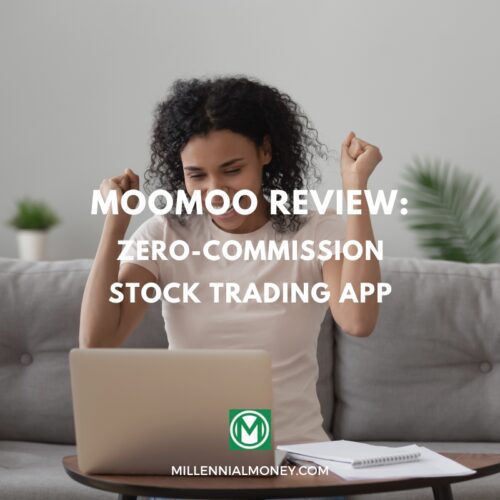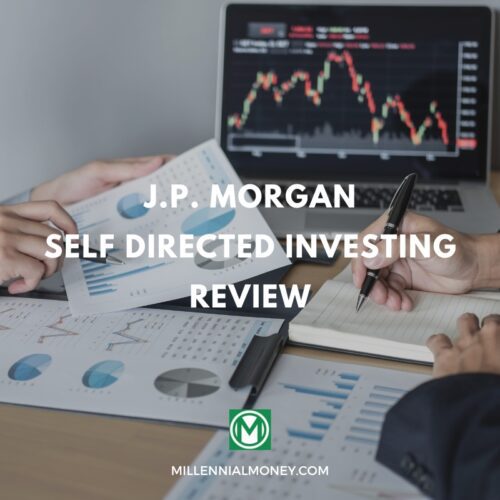M1 Finance and Betterment, two standouts in the online investing space, offer investors a completely different experience from one another.
In the guide below, we’re picking apart Betterment and M1 Finance, from their prices to their features and portfolio options, to help you choose the right platform.
M1 Finance vs Betterment: The Basics
Here’s a side-by-side breakdown of what M1 and Betterment have to offer.
| M1 Finance | Betterment | |||
|---|---|---|---|---|
| Account Minimum | – | $0; $100 to invest | – | $0 |
| Management Fees | No fees | .25% annual fee for digital plan; .40% annual fee for premium plan | ||
| Promotions | Up to $2500 cash bonus | Up to 12 months free service | ||
| Accounts Supported | – | Roth, Traditional, SEP IRA; individual and joint brokerage accounts; IRA rollovers; trust accounts | – | Roth, Traditional, SEP, Inherited IRA; individual and joint brokerage accounts; trust accounts; checking; savings |
| Portfolios | Fully customize your portfolio down to individual stocks, or choose from a variety of expert pies | Automated portfolio based on your risk level, goals and investing timeline | ||
| Customer Service | – | Support form; online resources; phone support Monday-Friday, 9:30 a.m.- 4:00 p.m. ET | – | Email; online resources; phone support Monday-Friday, 9:00 a.m.- 6:00 p.m. ET |
| Automated Rebalancing | – | Included | – | Included |
| Tax-loss Harvesting | Unavailable | Included | ||
| Access to Human Advisors | Unavailable | Included | ||
| Invest with M1 Finance | Invest with Betterment |
Overview of M1 Finance and Betterment
About M1 Finance
Launched in 2016, M1 Finance is a fairly new broker headquartered in Chicago, Illinois.
M1 was designed to provide you with automated investing that still puts you in the driver’s seat, with customizable portfolios.
With M1 Finance, you can either build your own portfolio with the stocks and ETFs available, or you can use one of M1’s dozens of expertly curated portfolios for a less hands-on experience.
You can select a theme for your investments or get more involved and hand pick the individual investments that make it up for yourself.
And you don’t have to limit yourself to just one portfolio. M1 lets you create dozens of portfolios easily.
When you invest with M1, you get to take the lead with your investments while still benefiting from not having to worry about high fees.
You can download the iOS or Android app to use M1 from your phone or tablet, or operate in the desktop version.
Learn more:
About Betterment
Founded in 2008, Betterment was one of the first robo-advisors to hit the market.
It’s proven to be one of the best investing platforms over the last decade, with over $22 billion of assets under management.
Betterment uses an algorithm to manage your investments rather than a human advisor, though there is a level of live advising available with Betterment.
Betterment works well for everyone from novice investors with a few hundred bucks to invest to pros looking to invest hundreds of thousands of dollars without costly advising fees.
Betterment helps you to reach your specific investing goals, within the bounds of your risk tolerance.
Once you fund your account, Betterment will start investing in the ETFs most likely to help you reach your financial goals.
You can manage your investments online with Betterment’s desktop version, or you can download the mobile app for your iOS or Android device.
Learn more:
Pricing
When it comes to cost, M1 Finance has the edge over Betterment, offering investors a completely free service.
With that being said, M1 also has a minimum balance requirement to begin investing, while Betterment has none.
Here’s a quick look at the fees (or lack of fees) you’ll encounter with each service.
M1 Finance Fees
- Commissions: M1 doesn’t charge any commission fees, meaning you can trade for free.
- Account management: The platform doesn’t charge any advising or management fees, either.
- Miscellaneous: The company is upfront about a handful of fees. For instance, there’s a charge for requesting paper copies. There’s also an inactivity fee if your balance is less than $50 and is inactive for 90 days.
- M1 Plus: M1’s premium version costs $10 per month and offers additional trading windows, increased cashback credit card rewards, better loan rates, and commission-free crypto trading.
You may see some regulatory fees for the funds themselves, but this is standard industry-wide.
M1’s stocks and ETFs have low expense ratios, keeping these fees to a minimum.
Betterment Fees
Betterment is also commission-free, and it doesn’t charge anything for withdrawals or deposits; however, it does come with annual fees.
You get to pick from two plans with Betterment:
- Digital Plan: Betterment’s base plan charges .25% annually and does not have a required minimum balance. It comes with targeted advice, automatic rebalancing, and tax strategies.
- Premium Plan: The premium plan has a .40% annual fee and a $100,000 minimum balance requirement. It comes with all of the features of the digital plan, plus financial advising for milestones throughout life and investments outside of Betterment.
You can also pay for additional consultation on specific investing topics.
Minimum Deposits
M1 Finance requires you to fund your taxable accounts with at least $100 and your retirement accounts with $500 to invest.
With Betterment’s digital plan, there is no minimum deposit required.
Promotions
Both M1 Finance and Betterment draw in new investors with opening bonuses.
M1 rewards new investors with cash when they fund their account, while Betterment waives account management fees.
Here’s a closer look at how these promotions work.
M1 Finance Promotion
M1 Finance will reward you with up to $15,000 when you transfer your account to the platform within 60 days of registering.
- $250 bonus: When you transfer a $100,000 to $249,999.99 account to M1.
- $1,000 bonus: When you transfer a $250,000 to $499,999.99 account to M1.
- $2,000 bonus: When you transfer a $500,000 to $999,999.99 account to M1.
- $4,000 bonus: When you transfer a $1 million to $1,999,999 account to M1.
- $10,000 bonus: When you transfer a $2 million to $4,999,999 account to M1.
- $15,000 bonus: When you transfer a $5 million+ account to M1.
Betterment Promotion
Betterment may give you up to a year of fee-free services if you make an initial deposit that meets Betterment’s criteria within 45 days of opening your account.
- 1 month of free services: When you deposit $15,000 to $99,999.
- 6 months of free services: When you deposit $100,000 to $249,999.
- 1 year of free services: When you deposit $250,000 or more.
Features
As far as features are concerned, it’s difficult to pick a winner between M1 and Betterment.
That’s because these two platforms offer you a totally different experience. It all depends on what you’re looking to get out of the app.
M1 Finance vs Betterment: Shared Features
As a refresher, here are a few features you get with both M1 Finance and Betterment:
- Low-cost investing: Both M1 and Betterment offer commission-free trades and keep their fees low in general.
- Automatic rebalancing: Each app shifts your allocations to keep your investments on track.
- New account bonuses: Depending on how much you invest, you could benefit from M1 or Betterment’s new account promotions.
- Brokerage, retirement, and cash accounts: With M1 and Betterment, you get a wide range of account types.
- Socially-responsible investing: Both apps let you build an ethical portfolio that considers not just the financial repercussions, but also the social and environmental impact of your investments.
- Fractional shares: M1 and Betterment let you invest in fractional shares of individual stocks, ideal for new investors on a budget or those looking to diversify.
- Educational resources: Both M1 Finance and Betterment offer educational resources online and in their apps.
Beyond the basic features above, M1 and Betterment have a few standout features.
M1 Finance Standout Features
- Self-directed investing: M1 Finance offers automation, but it also gives you the power to design your own portfolio and invest actively. With M1, it’s all about growth, rather than personalized goals, which is the right fit for some active investors.
- Expertly crafted portfolios: M1’s portfolios are referred to as pies. While you can make your own pies, you could also choose from professionally built pies.
- Borrowing: If your account balance permits, you can take out a line of credit using one of your investment accounts, at a far lower cost than an unsecured loan.
- Free account management: Perhaps the biggest standout feature of M1 Finance is its fee structure. M1 doesn’t charge a penny for its basic investing account, and it is remarkably transparent about its miscellaneous fees.
Betterment Standout Features
- Personalized guidance: Betterment assesses your goals, risk tolerance, and investing preferences, creating a tailor-made investment strategy based on you. That includes assistance from living breathing advisors. Once you work with Betterment to establish your goals, you can take a backseat and let the app work for you.
- Premium option: If you want to upgrade your services and get robo-advising plus virtually unlimited financial advising, Betterment’s got you covered for a low fee.
- Checking and savings account: With Betterment, you get access to both a checking and a high-yield savings account, making it a handy one-stop shop for investing and banking.
- Tax-loss harvesting: Unlike M1, Betterment does offer tax-loss harvesting, selling off assets with losses and replacing them with comparable ones to keep you on track for your goals.
Portfolios
While both platforms integrate Modern Portfolio Theory (MPT), M1 Finance and Betterment take a different approach to portfolios.
M1 Finance Portfolios
M1’s portfolios are all about customization. You can build your own portfolios from scratch, choose to invest in pre-made portfolios designed by experts, or do a combination of both.
Either way, it’s completely free. New investors can really benefit from M1’s expert pies, and more seasoned investors can easily build highly customized portfolios on their own.
When you build your own portfolio, you can invest in ETFs, individual stocks, or a combination of the two, with fractional shares on offer.
With expert pies, you still have tons of variety.
Many of the portfolio strategies are goals-based, while others are thematic. Some of the expert pies you can invest in fall into the following categories.
- Risk-based investing
- Target retirement date
- Hedge fund followers
- Income earners
- Industries/sectors
- Stocks & bonds
- Socially responsible
- Hedge fund followers
- Trinity portfolios from Cambria Investments
You can also choose specialized pies centered around blue chip stocks and other strategies.
Your portfolio will get rebalanced automatically every month, and you have the option to rebalance it more often.
While M1 doesn’t have tax-loss harvesting, it does utilize a tax loss strategy.
Betterment Portfolios
Betterment is more suited to passive investors who are focused on specific investing goals, and it shows in the platform’s portfolio strategy.
When you get a Betterment account, you’ll be prompted to answer questions to ascertain your risk level, goals, and investing timeline.
From there, Betterment’s algorithm will build your portfolio, investing in up to 13 asset classes.
While you can choose the individual stocks and ETFs that comprise your portfolio with M1, Betterment does the allocating for you.
Betterment automatically rebalances your account if it gets off target, and it comes with the benefit of tax loss harvesting.
Human Advising
Both M1 Finance and Betterment offer customer support online and over the phone, with detailed content for troubleshooting account issues.
However, if you want actual one-on-one financial advising, Betterment is the better choice.
While its customer service reps and online resources are useful, M1 doesn’t provide you with access to financial advisors.
On the other hand, unlimited financial consulting is included with Betterment’s premium account.
You can also pay a fee for consulting with a financial advisor regardless of your account level.
User Experience
In terms of user experience, you can’t go wrong with Betterment or M1 Finance.
Both apps are beautifully designed and couldn’t be simpler to use.
They’re full of useful resources and make managing your account easy.
M1 and Betterment are both highly reviewed in the app store, and their desktop versions are just as impressive.
M1 Finance vs Betterment: Which App Is Right for You?
M1 Finance and Betterment are two low-cost, user-friendly, and well-reviewed services, topping my list of the best automated investment platforms.
So which one is right for you is really a matter of preference.
If you want a truly free app and don’t need guidance from a financial advisor, M1 is the clear winner.
It’s also a better pick if you want to play an active role in directing your accounts, with customization that’s hard to beat.
However, if you need advising and want an investment strategy tailored to your goals, Betterment is second-to-none.
Betterment makes investing as hands-off an experience as possible, letting you sit back and relax.
Whichever app you choose, you’ll be able to grow your investments quickly and easily without paying excessive fees.







No comments yet. Add your own